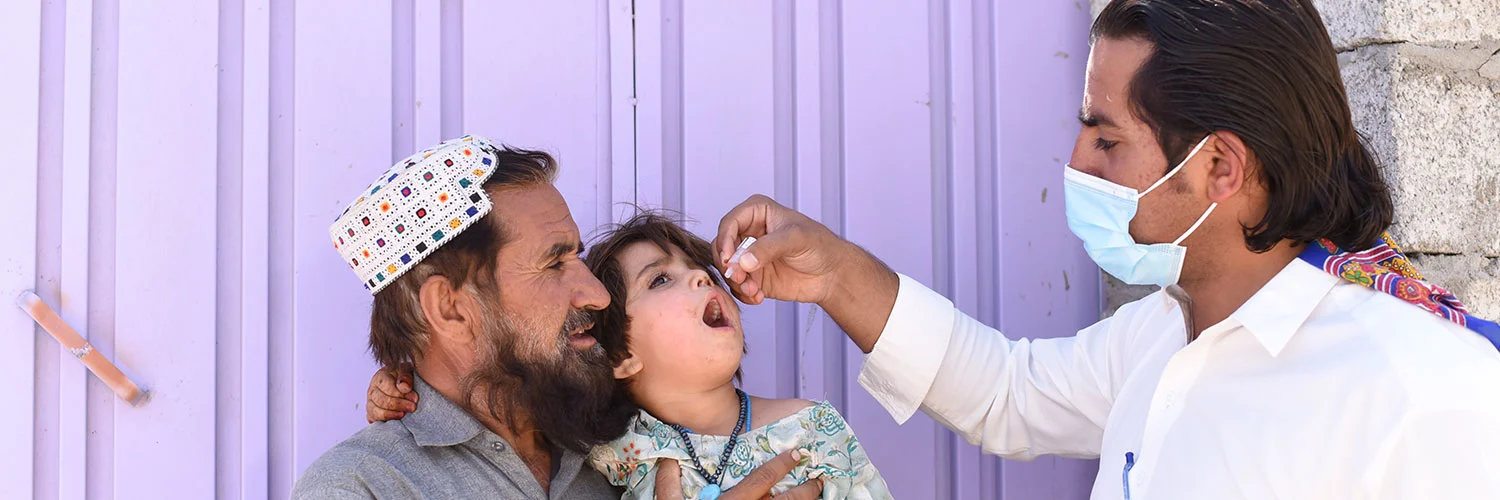Islamabad, May 4, 2024 – The fight against polio in Pakistan reaches a critical juncture as a high-level delegation from the Global Polio Eradication Initiative (GPEI) concludes their visit from April 30 to May 3, underscoring the urgency for innovative strategies to reach children not being vaccinated and enhanced political commitment to achieve eradication.
Led by Dr. Chris Elias, Chair of the Polio Oversight Board (POB) and President of Global Development at the Bill & Melinda Gates Foundation, the delegation engaged in discussions with Pakistan's political and security leadership to address persistent challenges in the final stages of eradication efforts. The delegation also comprised of WHO Regional Director for the Eastern Mediterranean Region, Dr Hanan Balkhy, UNICEF South Asia Regional Director, Sanjay Wijesekera, CDC’s Polio Eradication Branch Chief, Dr Omotayo Bolu, and Trustee Rotary Foundation and National Polio Plus Committee Chair, Aziz Memon.
In Islamabad, they met the with Prime Minister Shehbaz Sharif, Acting Foreign Secretary Rahim Hayat Qureshi, Coordinator to the PM on Health Dr Malik Mukhtar Ahmed Bharath and Pakistan Army’s Engineer-in-Chief Lt-Gen Kashif Nazir.
The POB is the highest decision-making and oversight body of the GPEI – the largest international public health initiative aiming to end polio globally. This was the first high-level GPEI visit to Pakistan since the formation of the new government in March. The focus of the visit was to strengthen political commitment in Pakistan to eradicate polio.
“During my time in Pakistan, I have once again been impressed by the commitment from the federal and provincial governments to stopping polio transmission. With continued commitment across the country from leaders, and at all levels, I know the final push to defeat polio will be possible,” said POB Chair Dr Chris Elias.
The delegation also visited Peshawar and Lahore where they held meetings with the provincial chief ministers of Khyber Pakhtunkhwa and Punjab as well as provincial health ministers and chief secretaries to discuss their respective provinces’ progress and challenges on polio eradication.
“Engaging with Pakistan’s new political leadership during this visit has demonstrated the commitment of all partners to polio eradication, but we must use the coming months to leverage this commitment wisely, or we risk losing the momentum and the confidence that we can get the job done,” Dr Hanan Balkhy, WHO’s Regional Director for the Eastern Mediterranean Region.
She added: “Pakistan has the real opportunity to stop the endemic strain of poliovirus that has been restricted to south Khyber Pakhtunkhwa province. Strengthening the tailored responses to the increased detections of the imported poliovirus in the historic reservoirs is going to be critical to prevent largescale outbreaks in the coming months.”
Pakistan is one of only two polio-endemic countries. The country has made significant progress in reducing polio cases and eliminating diverse poliovirus strains in recent years. However, several challenges persist in its last mile of eradication, including disruptions to vaccination campaigns caused by insecurity, children being missed in vaccine campaigns and community distrust.
“We know what to do; we know how to do it. It is incumbent on all of us – government, health workers, partners and communities – to work together determinedly to keep every child in Pakistan safe from this deadly and preventable disease,” said UNICEF Regional Director for South Asia Mr Sanjay Wijesekera.
Recognizing the significance of tailored strategies, the delegation highlighted the imperative of reaching migrant populations in infected and high-risk districts. Drawing from successful experiences in India, where vaccination efforts focused on thoroughly mapped migrant populations were pivotal, it was stressed that similar approaches are indispensable for further progress. The delegation also underscored the indispensable role of Routine Immunization (RI) in sustaining hard-won gains in polio eradication. Collaboration with the Expanded Programme on Immunization (EPI) was highlighted as paramount, particularly in areas with pressing health needs.
Stronger political commitment was identified as a linchpin for addressing legitimate demands of deprived communities for services and galvanizing health workers. The delegation advocated for leveraging influence and support to engage community influencers, ensuring comprehensive community participation in vaccination.
Aziz Memon, Trustee Rotary Foundation/National Chair, Pakistan PolioPlus Committee said: “Rotary International congratulates the Government of Pakistan on its progress in the fight against polio and encourages a renewed and urgent commitment to addressing the remaining challenges the Polio Programme faces.”
“Rotary has invested almost US$427 million in polio eradication efforts in the country and affirms our continued support to the Polio Programme until the goal is accomplished and all children in Pakistan are protected from polio,” he said.
The visit coincided with the ongoing immunization campaign from April 29 to May 6, aimed at vaccinating over 24.4 million children under the age of five in 91 districts. Amidst these efforts, the GPEI delegation's engagement signifies a pivotal moment in Pakistan's fight against polio, urging concerted action and unwavering commitment from all stakeholders.
Note:
Polio is a highly infectious disease caused by poliovirus mainly affecting children under the age of five years. It invades the nervous system and can cause paralysis or even death. While there is no cure for polio, vaccination is the most effective way to protect children from this crippling disease. Each time a child under the age of five is vaccinated, their protection against the virus is increased. Repeated immunisations have protected millions of children from polio, allowing almost all countries in the world to become polio-free, except for the two endemic countries of Pakistan and Afghanistan.
For further information, please contact:
Ms Hania Naeem, Communications Officer, NEOC,
Contact No:+923431101988
Email: This email address is being protected from spambots. You need JavaScript enabled to view it.

